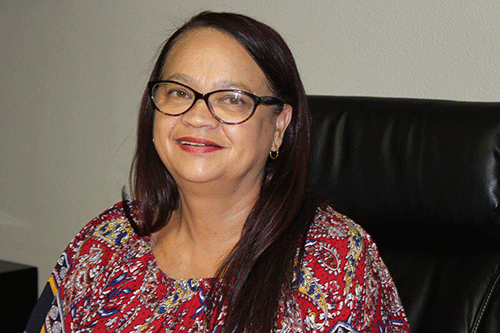42 years in the public service
Desery Hess is the epitome of the consummate civil servant worthy of emulation. She is one of the original government employees that witnessed the implementation of biometric and identity system in Namibia just before independence.
For over four decades, she has been responsible for the preparation, and verification of fingerprints at the Ministry of Home Affairs, Immigration, Safety and Security in Windhoek.
She joined the department of home affairs in August 1979. “I joined the ministry of home affairs straight from high school and with no work experience. I joined with a group of 30 people, some were sent to Otjiwarongo, but I was among the group that remained in Windhoek,” Hess remembers about the beginning of her long career in public service.
“Luckily enough, the then Burgersake en mannekraag (Civil Affairs and Manpower) was hiring. They needed people, to begin with, the issuance of identity documents for the first time in Namibia and that was how I got lucky and joined the ministry.”
She dropped out of school while in grade 11 at Ella Du Plessis High School and decided to get a job at the age of 19 to take care of her grandparents.
“I had just dropped out of school and was job hunting when I came across the posts at the ministry of home affairs. In other words, it was the first opportunity that I got. I just wanted a job, for me to be able to support my grandparents. But when I started with training, I began to love working for the government, though my dream was to work with children because I love children,” she said.
Hess has been tasked with countless responsibilities throughout her illustrious public service career. She began as a fingerprint officer in 1987 before being promoted to the position of principal fingerprint officer. In 2004, she was elevated to senior fingerprint officer and then chief fingerprint officer in 2010.
“Apart from managing and supervising staff members under me, I also gave training to officers and handled queries from the department of police and mortuary to help with the identification and verifications of persons,” she said.
She has also put her vast knowledge in fingerprint management to good use by training others.
“I have trained so many colleagues as they were joining the ministry. I would say I have trained roughly 30 or more people in the fingerprint verification system. That was before the automated fingerprint identification system (AFIS) was introduced.”
She said fingerprint verification was a hectic job back then before the introduction of the AFIS.
“Apart from the fact that I had to use a magnifying glass to count the ridges of fingerprints of individuals for verification purposes from 1979 to 2004 when the AFIS was introduced, I took everything as it came and tried to learn from such experiences as much as possible. Most importantly, I took such challenges as lessons which helped to groom me into the person that I am today,” she said.
Nonetheless, the results of her job outweighed the challenges. “Knowing that the job that I was doing helped families to unite with their family members and to root out criminals from society through the verification process, gave me solace. In addition, working with my colleagues for all those years was total bliss, as they became my second family.”
About the good old memories, Hess has a lot to share. “One of the best memories about being a public servant was travelling out with my colleagues to remote rural areas, whereby people who live there do not have national documents. Being in a position to help register and issue fellow citizens with identity documents gave me great joy. When the automated fingerprint identification system was introduced, I was sent to China for training - the experience was also amazing.”
During her long service, Hess has seen colleagues joining and leaving the public service for greener pastures. For her, it was about the passion to serve her fellow citizens.
“I was not motivated to leave for greener pastures because I was committed and content with my work,” she said about working for the same ministry for the past 42 years. “I never saw the need of moving to another organisation because I was passionate about my job. The best part of it was working with people from different cultural backgrounds who became family.”
Recently, Hess retired from public service. “I am just excited to be going on retirement. That means spending a lot of precious time with my family and grandchildren,” said the Windhoek-born mother of three.
In addition, she advises the young ones, joining the public service “not to always focus on bigger paycheques, but a friendly working environment is far more important. In addition, they should be committed to their work to deliver quality service to the public.”


